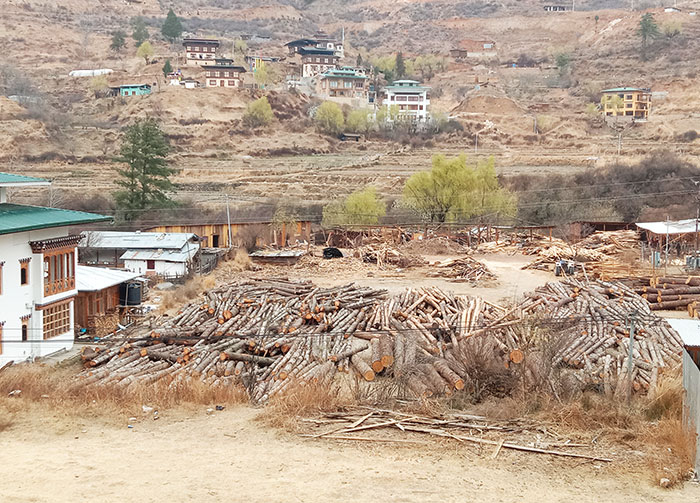Choki Wangmo
Months after an executive order was issued urging stand-alone sawmills to upgrade to an integrated wood-based industry, saw-millers across the country are confused, worried, and waiting for some clarity from the government.
Many say that, without completely stopping import of wood-based products, investment in the integrated wood-based industry is meaningless.
Yeshi Lhaden’s sawmill has been closed for about three years now. With ample imported products available at a cheaper rate, she said there was no use venturing into sawmill and furniture house.
“I have licenses for both sawmill and furniture house, but they are proving to be increasingly useless.”
A saw-miller said that, without domestic and export markets, investing in the business was a huge risk.
A machine for an integrated wood-based industry costs at least Nu 3-4 million (M). Upgrading could bring the cost up to Nu 0.8M more.
With the construction sector at a standstill due to Covid-19, many sawmills have run out of business. Logs are reportedly rotting in the backyards.
Upon receiving the order, some have started upgrading works. The order, however, doesn’t clearly say what the integrated wood-based industry really means.
This has created confusion among saw-millers.
Manager of Sonam sawmill, Madhan Kumar Rai, said that building a furniture unit could be an upgrade to an integrated wood-based industry. “Since March 1, we’ve been working on upgrading the sawmill. We’re planning to buy wood mizers but we need loan support from the government.”
The owner of Phubgyal sawmill in Ramtokto, Thimphu, Joshuan, said that the mill had been working on upgrading the machines. He set up a furniture unit and joinery and bought a wood mizer last year.
“Upgradation would be difficult without government support. We need heavy duty machines and hydraulics,” he said.
Most sawmills today operate manually.
Another sawmill owner said that the cost of a machine for integrated wood-based industry was as high as seven million.
“Integrated wood-based industry is a wise move, but if the rate of recovery is lesser than the rate of investment, we’d run into loss,” he said.
He said that the sawmills did not have access to good quality wood.
“If the government can supply us with enough and quality woods, it won’t be an issue. We get only about 1,000cft in about three months,” he said, adding that production of ply boards and tiles could improve if import was tightly regulated.
Saw-millers supply wood only for windows and doors to construction companies.
An owner of Phuntsho sawmill in Phuentsholing, Phuntsho Wangdi, said that it was not necessary for saw-millers to upgrade the mill entirely at once.
“We’re yet to propose to the ministry for access to soft loans,” he said.
If import continued, nothing would change significantly, he added. “We import billion worth of wood-based products but then our timbers are rotting at the depots.”
The association of wood-based industries, according to Phuntsho Wangdi, is proposing wood-based industries in every dzongkhag meet local demand for wood and to ensure optimal use of available resources.
An owner of an integrated wood-based industry in Gelephu said that the upgrade and purchase of machines depended on the production capacity. “Upgradation has more potential to earn profits but investment has to be there, which is very expensive.”


